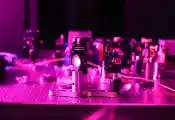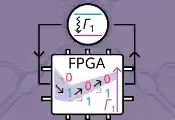Colombia’s First Quantum Computer: Advancing Education, Research, and Technological Innovation
December 04, 2024 -- Thirty years ago, the University of the Andes made the first internet connection in Colombia, and on Tuesday, December 3, the country’s first quantum computer will be unveiled. This acquisition marks a turning point in education and technological research, fostering interdisciplinary collaboration and enhancing ongoing efforts by researchers at the University of the Andes and other institutions.
The University’s Faculties of Science and Engineering announced the arrival of the device, which will enable students and professors to explore fundamental aspects of quantum computing. This emerging technology seeks to solve problems and process information differently by leveraging the laws of quantum physics.
A Historic Milestone in Education
Professor Julián Rincón, a theoretical physicist, explains that this quantum computer employs a technique known as Nuclear Magnetic Resonance and operates at room temperature. This makes it particularly suitable for educational purposes, as it is easy to assemble and provides a straightforward way to test fundamental concepts. “This isn’t just a faster conventional computer; it’s a completely new way of processing information, based on the laws of quantum physics,” he clarifies.
Valérie Gauthier, a professor from the Department of Systems and Computing Engineering, highlights the significance of this acquisition: “We are thrilled to introduce the first quantum computer in Colombia. We want students to take advantage of this, get interested, and work in areas like quantum computing and related topics such as post-quantum cryptography.”
Making Quantum Concepts Tangible
Professor Alejandra Valencia, an expert in quantum optics, emphasizes how this computer makes abstract quantum equations more tangible. “It allows us to visualize these ideas, moving beyond just mathematical equations,” she explains. Valencia also notes that the foundation for this knowledge has been developed over years in the university’s quantum optics laboratories, recalling a 12-year-old project involving the quantum key distribution protocol using photons.
The Role of Quantum Computing
Quantum computing is still in its early stages of development, making it essential for students to access this technology early on to transition from theory to practice and enhance research in the field. “It’s like opening the doors to a laboratory where the future of computing becomes a tangible reality,” says Gauthier.
Professor Rincón underscores the importance of multidisciplinary collaboration to achieve significant advances in quantum computing. He highlights the integration of physics, computer science, chemistry, and engineering as vital. Quantum computing processes information and performs calculations differently, promising to address problems that traditional computers cannot solve due to time or capacity limitations.
A Commitment to Cutting-Edge Research
Although the exact impact of quantum computing remains uncertain, Rincón notes that the scientific community agrees its primary application lies in deepening our understanding of quantum systems. “History has shown that such understanding often leads to technological developments we can’t yet predict,” he explains.
The arrival of this quantum computer reinforces the University’s commitment to cutting-edge research, bolstering its efforts in this area. Professors Valencia and Gauthier agree that this developing technology has the potential to accelerate progress in various fields. Valencia points out that “classical computing is excellent and will continue to evolve, but quantum computing can, for instance, facilitate simulations of biological systems.” Meanwhile, Gauthier adds, “This is the beginning of a fascinating field that could bring new ways of solving problems, accelerating advancements in areas like AI, and impacting various disciplines.”
This milestone represents a leap forward in Colombia’s technological landscape, setting the stage for future innovation and discovery.




































